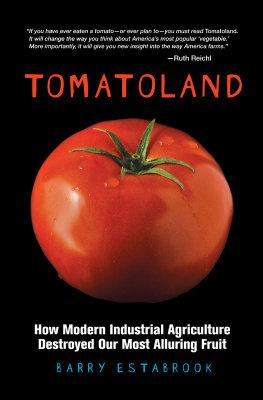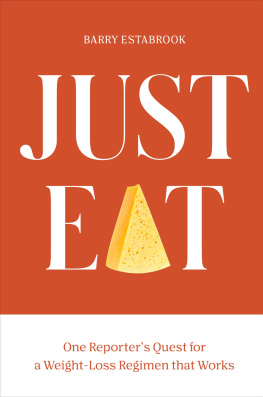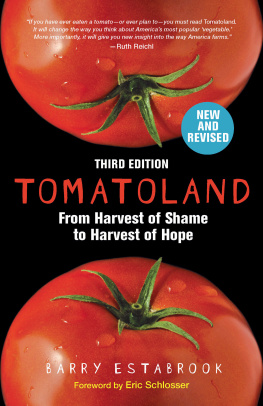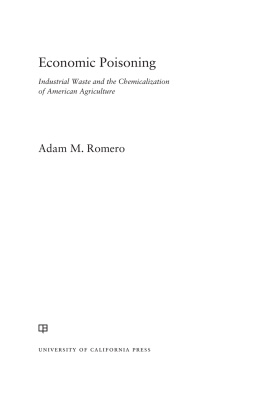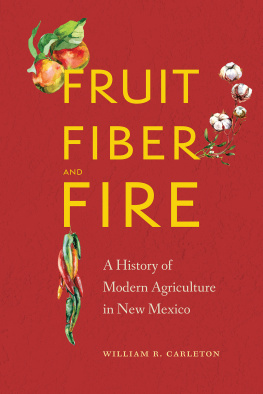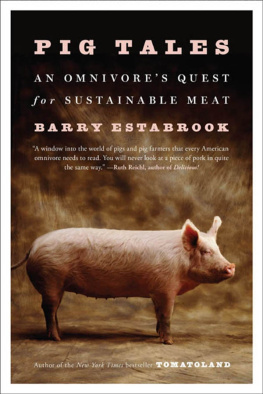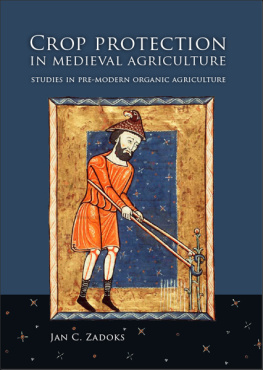Barry Estabrook - Tomatoland: How Modern Industrial Agriculture Destroyed Our Most Alluring Fruit
Here you can read online Barry Estabrook - Tomatoland: How Modern Industrial Agriculture Destroyed Our Most Alluring Fruit full text of the book (entire story) in english for free. Download pdf and epub, get meaning, cover and reviews about this ebook. year: 2011, publisher: Andrews McMeel Publishing LLC, genre: Art. Description of the work, (preface) as well as reviews are available. Best literature library LitArk.com created for fans of good reading and offers a wide selection of genres:
Romance novel
Science fiction
Adventure
Detective
Science
History
Home and family
Prose
Art
Politics
Computer
Non-fiction
Religion
Business
Children
Humor
Choose a favorite category and find really read worthwhile books. Enjoy immersion in the world of imagination, feel the emotions of the characters or learn something new for yourself, make an fascinating discovery.
- Book:Tomatoland: How Modern Industrial Agriculture Destroyed Our Most Alluring Fruit
- Author:
- Publisher:Andrews McMeel Publishing LLC
- Genre:
- Year:2011
- Rating:4 / 5
- Favourites:Add to favourites
- Your mark:
- 80
- 1
- 2
- 3
- 4
- 5
Tomatoland: How Modern Industrial Agriculture Destroyed Our Most Alluring Fruit: summary, description and annotation
We offer to read an annotation, description, summary or preface (depends on what the author of the book "Tomatoland: How Modern Industrial Agriculture Destroyed Our Most Alluring Fruit" wrote himself). If you haven't found the necessary information about the book — write in the comments, we will try to find it.
Barry Estabrook: author's other books
Who wrote Tomatoland: How Modern Industrial Agriculture Destroyed Our Most Alluring Fruit? Find out the surname, the name of the author of the book and a list of all author's works by series.
Tomatoland: How Modern Industrial Agriculture Destroyed Our Most Alluring Fruit — read online for free the complete book (whole text) full work
Below is the text of the book, divided by pages. System saving the place of the last page read, allows you to conveniently read the book "Tomatoland: How Modern Industrial Agriculture Destroyed Our Most Alluring Fruit" online for free, without having to search again every time where you left off. Put a bookmark, and you can go to the page where you finished reading at any time.
Font size:
Interval:
Bookmark:


Tomatoland copyright 2011 by Barry Estabrook. All rights reserved. No part of this book may be used or reproduced in any manner whatsoever without written permission except in the case of reprints in the context of reviews.
Andrews McMeel Publishing, LLC
an Andrews McMeel Universal company
1130 Walnut Street, Kansas City, Missouri 64106
Portions of this book have appeared in different form in Gourmet, Gastronomica, Saveur, and the Washington Post.
E-ISBN: 978-1-4494-0841-1
Library of Congress Control Number: 2010937751
www.andrewsmcmeel.com
Jacket design by Tim Lynch
Jacket photography by Kenny Johnson
Author photo by Trent Campbell
ATTENTION: SCHOOLS AND BUSINESSES
Andrews McMeel books are available at quantity discounts with bulk purchase for educational, business, or sales promotional use. For information, please e-mail the Andrews McMeel Publishing
Special Sales Department:
For the men and women who pick the food we eat
This book would have never been written had Ruth Reichl and John Willoughby at Gourmet magazine not had the integrity and courage to print an article about modern-day slavery in a national food magazine. Thanks also to Marisa Robertson-Textor, Christy Harrison, and Adam Houghtaling at Gourmet for keeping the story alive online, the facts straight, and the Cond Nast lawyers happy.
My interest in tomato production in Florida was sparked by two terrific magazine articles: Tomatoes, by Thomas Whiteside (the New Yorker, January 24, 1977), and A Matter of Taste: Who Killed the Flavor in Americas Supermarket Tomatoes? by Craig Canine (Eating Well, January/February 1991). That these articles have stood the test of time is both a tribute to the quality of their research and writing and an indication of how little the Florida tomato industry has changed. Three excellent books also inspired and informed me. I am heavily indebted to their authors and heartily recommend their work. Nobodies by John Bowe and The Slave Next Door by Kevin Bales and Ron Soodalter both examine involuntary servitude in the Unites States today, and Ripe by Arthur Allen provides an engaging, informative portrait of all things tomato. Any writer researching labor abuses in Florida owes an enormous debt to the tireless reporting of Amy Bennett Williams of the Fort MyersNews-Press and John Lantigua of the Palm Beach Post.
Members of the Coalition of Immokalee Workers were generous with their time and tolerance for a curious reporter: Greg Asbed, Lucas Benitez, Emilio Galindo, Laura Germino, Jose Hilario Medel, Leonel Perez, Julia Perkins (Translator Extraordinaire), and Geraldo Reyes. I am also grateful for the help I received from Jordan Buckley and Meghan Cohorst of the Student/Farmworker Alliance. Elsewhere in Florida, thanks to Jeannie Economos, Pedro Jesus, Victor Grimaldi, Linda Lee, Greg Schell, Steven Kirk, Barbara Mainster, Tom Beddard, Andrew Yaffa, Yolanda Cisneros, Joseph Procacci, and Reggie Brown.
From academia, Roger Chetelat, Harry Klee, Jay Scott, and Monica Ozores-Hampton were generous with information about tomato breeding and horticulture. Any errors are my own. I would like to stress that information about the effects of agricultural chemicals came from my own research and is in no way attributable to them.
Thanks, Tim Stark and Wayne Miller, for showing me how tomatoes should be grown and letting me ride shotgun. And to Chef Peter Hoffman of Savoy and Back Forty in New York, long a champion of buying local food and great tomatoes.
My agent David Black helped me shape this idea and then placed it with the perfect publisher. Thanks to Kirsty Melville, Chris Schillig, Amy Worley, Tammie Barker, John Carroll, Tim Lynch, Holly Ogden, and Dorothy OBrien at Andrews McMeel. Much appreciation to Jacinta (Flying Fingers) Monniere for cleaning up the manuscript and thereby preventing it from being later than it was.
As in everything I do, I had the advantage of the support and shrewd insights of Rux Martin throughout this project, my partner, my teammate, and the most wonderful editor in the world.
introduction

M y obituarys headline would have read Food Writer Killed by Flying Tomato.
On a visit to my parents condominium in Naples, Florida, I was mindlessly driving along the flat, straight pavement of I-75, when I came up behind one of those gravel trucks that seem to be everywhere in southwest Floridas rush to convert pine woods and cypress stands into gated communities and shopping malls. But as I drew closer, I saw that the tractor trailer was top heavy with what seemed to be green Granny Smith apples. When I pulled out to pass, three of them sailed off the truck, narrowly missing my windshield. Chastened, I eased back into my lane and let the truck get several car lengths ahead. Every time it hit the slightest bump, more of those orbs would tumble off. At the first stoplight, I got a closer look. The shoulder of the road was littered with green tomatoes so plasticine and so identical they could have been stamped out by a machine. Most looked smooth and unblemished. A few had cracks in their skins. Not one was smashed. A ten-foot drop followed by a sixty-mile-per-hour impact with pavement is no big deal to a modern, agribusiness tomato.
a fresh tomato from a grocery store or restaurant, chances are good that you have eaten a tomato much like the ones aboard that truck. Although tomatoes are farmed commercially in about twenty states, Florida alone accounts for one-third of the fresh tomatoes raised in the United States, and from October to June, virtually all the fresh-market, field-grown tomatoes in the country come from the Sunshine State, which ships more than one billion pounds to the United States, Canada, and other countries every year. It takes a tough tomato to stand up to the indignity of such industrial-scale farming, so most Florida tomatoes are bred for hardness, picked when still firm and green (the merest trace of pink is taboo), and artificially gassed with ethylene in warehouses until they acquire the rosy-red skin tones of a ripe tomato.
Beauty, in this case, is only skin deep. According to figures compiled by the U.S. Department of Agriculture, consumer satisfaction. No one will ever be able to duplicate the flavor of garden-grown fruits and vegetables at the supermarket (or even the farmers market), but theres a reason you dont hear consumers bemoaning the taste of supermarket cabbages, onions, or potatoes. Of all the fruits and vegetables we eat, none suffers at the hands of factory farming more than a tomato grown in the wintertime fields of Florida.
Perhaps our taste buds are trying to send us a message. Todays industrial tomatoes are as bereft of sodium.
supermarket tomatoes and brought them home for a tasting. I put four on the counter and reached for a cutting board, accidentally nudging one. I was too slow to stop it and watched as it rolled off the counter and fell on our newly refinished pine floor. It hit and traveled for a few feet but incurred no damage. As I retrieved it, my partner came into the kitchen, and I tossed the tomato at her playfully. She shrieked and dodged, and my hardy store-bought tomato struck the floor with the solid thud of a baking potato. I bowled the fruit through the kitchen door, across the dining room, over a wooden threshold, onto the tile floor of the sunroom, where The Tomato That Would Not Die crashed against the door. No damage done.
Font size:
Interval:
Bookmark:
Similar books «Tomatoland: How Modern Industrial Agriculture Destroyed Our Most Alluring Fruit»
Look at similar books to Tomatoland: How Modern Industrial Agriculture Destroyed Our Most Alluring Fruit. We have selected literature similar in name and meaning in the hope of providing readers with more options to find new, interesting, not yet read works.
Discussion, reviews of the book Tomatoland: How Modern Industrial Agriculture Destroyed Our Most Alluring Fruit and just readers' own opinions. Leave your comments, write what you think about the work, its meaning or the main characters. Specify what exactly you liked and what you didn't like, and why you think so.

